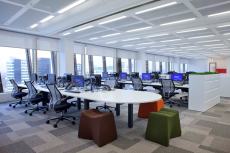June 27, 2013
Ergonomics of dishonesty. How desk size influences behaviour
The influence the design and layout of the workplace can have on productivity is widely acknowledged. Now, according to a new scientific study expansive physical settings like having a big desk to stretch out at work can cause individuals to feel more powerful, and in turn these feelings of power can elicit more dishonest behaviour such as stealing, cheating, and traffic violations. This might sound far-fetched but The Ergonomics of Dishonesty was written by a group of researchers at leading business schools, including Harvard, Columbia and Berkeley and is soon to be published in a forthcoming issue of the journal Psychological Science. Co-author Andy Yap, explained: “Our research shows that office managers should pay attention to the ergonomics of their workspaces. The results suggest that these physical spaces have tangible and real-world impact on our behaviours.” More →



























June 19, 2013
Five essential things to consider before you implement a BYOD policy
by Julia Johnston • Comment, Facilities management, Technology, Workplace
BYOD is far more than just allowing your staff to check their email on their personal mobile. It’s about the security of corporate information – we’re all demanding more flexible working to fit our lifestyles, but with flexibility comes personal responsibility. Are we rushing to join the BYOD party without realising some of the more serious considerations. A recent article on OfficeInsight considered a Gartner survey which suggested that BYOD would be prevalent by 2017. The article implied that companies should embrace this as an inevitable change. Before we get too excited, though, let’s explore some of the issues that BYOD should be raising for employers – including the technical demands that these policies make on IT departments and infrastructure, and the compliance IT departments will demand of staff.
More →